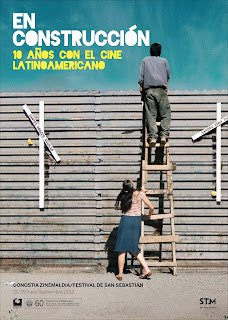 I believe that I decided to watch this movie for the wrong reasons but can't take all the blame as film has been promoted as a lesbian interest film since won the FIPRESCI prize at the 2009 Biennale and stimulated my interest more for being a Vietnamese film in the genre than anything else. The wait was long and expectations grew after watching trailer and continue reading about film, while skipping reading reviews as don't like spoilers. Always say that having expectations is not good and now add, watching a film expecting to see something specific is worst as if you don't find it you will not be able to objectively appreciate it. Sigh.
I believe that I decided to watch this movie for the wrong reasons but can't take all the blame as film has been promoted as a lesbian interest film since won the FIPRESCI prize at the 2009 Biennale and stimulated my interest more for being a Vietnamese film in the genre than anything else. The wait was long and expectations grew after watching trailer and continue reading about film, while skipping reading reviews as don't like spoilers. Always say that having expectations is not good and now add, watching a film expecting to see something specific is worst as if you don't find it you will not be able to objectively appreciate it. Sigh.Let me start by saying that yes film has some lesbian interest, not only has one character (Cam) that you can deduce is lesbian but also you get enough clues to realize that she is in love with Duyen, the main character in the film. But Cam is such an unpleasant character that you really don't know if she did not attended Duyen wedding because the not-corresponded love, her neurasthenic cynicism and/or her later diabolically persuasions that suggest revenge to Duyen's not loving her more than a friend or perhaps just because she's sour and unhappy. Not a pleasant character and not a pleasant story.
But basic story is all about Duyen sexual awakening that marries Hai three months after meeting him and in the wedding night Hai gets so drunk that does not consummate their marriage; as weeks go by Hai, a night shift taxi driver, sleeps and sleeps and continues his sans sex marriage. Thanks to Cam devilish machinations, neglected Duyen meets Tho, a handsome lothario tourist guide, who seduces her the minute he meets her. Is Cam who convinces Duyen to take temporary job as a translator on one of Tho's tours knowing what will happen. Nothing is shown on the screen but you can deduce that she is traumatized by her sexual awakening in the hands of Tho. There is more to the story, but you have to watch film to learn it. Also not a pleasant story to see.
No doubt that this film is trying to show an "evolving" Vietnamese society that is trying to postively and more humanly transform their traditional family values, where male chauvinism in a matriarchal world prevails and women impose their rules everywhere apart from sex, but in my opinion film does it in with so much restrain that kills the emotions and you end-up not feeling for any of the characters.
So why do I say that watched for the wrong reasons? As you can see I definitively saw the story but I didn't saw much of the film. If I had been paying more attention to the film then maybe I could have enjoyed it more as surely film is very visual, with slow pace, many silences, performances that speak more with face and body expressions, many symbols to decode -like the use of water-, etc. Exactly the kind of film that mesmerizes me. I know film has all this elements because I realized it after reading about film and recalling scenes that exemplified everything I read. Sigh. No, will not see it again, as the story spoiled film thanks to being so unpleasant.
Can't recommend film to my regular readers that enjoy the lesbian interest genre as probably will not enjoy the unpleasant story; but I know that some of you also enjoy art house movies and if you decide to watch film suggest to try to forget about your lesbian interest expectations and maybe then you will be able to enjoy this restrained melodrama, discreetly lyrical and mildly erotic that yes, has many interesting visuals.
Believe film is suited for those that like art house films, specifically Southern Asian-cinema characterized for a very particular subtle lyrical style.
On second thought maybe I'll watch movie again, but will wait a long time before doing it hoping that time will erase my terrible experience with this film.
Sigh.
Watch trailer @MOC













